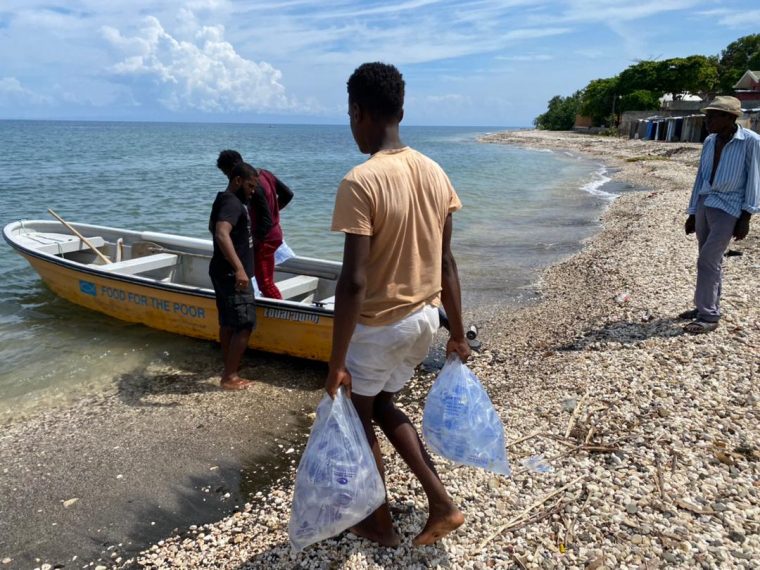The Aquarium will be closed to the public on Wednesday, April 2, for an internal staff event. Regular operating hours will resume on April 3.

BOSTON, MASS. (Oct. 4, 2021) – In August, a 7.2 magnitude earthquake caused massive destruction and devastation to southern Haiti. Two days after the earthquake hit, Tropical Storm Grace wreaked further havoc on the area, bringing torrential rain and high velocity winds. To provide immediate relief to the fishers and their families, the New England Aquarium’s Marine Conservation Action Fund (MCAF) granted Haiti Ocean Project nearly $20,000 in special assistance for critical drinking water and other emergency supplies.
“We have been able to provide urgent relief to fishers in the Nippes Department, thanks to funding for earthquake emergency relief from MCAF,” said Haiti Ocean Project President Jamie Aquino. “Thankfully, in Haiti, we can purchase drinking water in small plastic bags, which we have already distributed to local fishers and is saving lives, as many are dehydrated and in desperate need of fresh water to drink.”
The fishers receiving drinking water through the grant are part of a species monitoring network started by Haiti Ocean Project. They document and report to the Project the species they encounter while on the water. Through their work and learning about the important role of sharks in the ecosystem, recently more of the fishers are releasing these animals rather than harvesting them, even in the current challenging post-earthquake situation.
In October, a ship from Accordia Shipping will travel from Port Everglades, Florida to the Port of Miragoane, Haiti with additional essential supplies including tents, waterproof tarps, sleeping bags, solar-powered lanterns and medical supplies. In the short term, the supplies will provide vital aid to the fishers who have played such a critical role in the Haiti Ocean Project. The long-term goals of the grant are to support Haiti Ocean Project in further strengthening the trust they have built with the fishers and increasing support from the community, to continue initiatives involving protecting sharks, sea turtles, and stingrays as well as documenting marine mammal populations.
“This water is not just helping us but also our families,” said Emmanuel Denis, a shark fisher turned marine conservationist from Anse a Veau.
“We are honored to be able to continue our support for Haiti Ocean Project especially during this time of need,” said MCAF Director Elizabeth Stephenson. “The work Haiti Ocean Project does in collaboration with fishers is crucial to protecting and documenting marine mammal populations in the area, and we will be here for the organization to provide assistance in any way we can.”
Haiti Ocean Project has received two MCAF grants in the past. In 2017, the funding enabled them to facilitate the development of a marine ecosystem monitoring network of top-level species operated by local fishers and Haitian youth. The network increased Haiti Ocean Project’s knowledge of the abundance of top-level species that exists in Haitian waters and provided training, species identification guides and surveys to assist with data collection. In 2020, Haiti Ocean Project received their second grant from MCAF for exploration of the first documented refuge of critically endangered juvenile oceanic whitetip sharks, with the goals of learning more from fishers about the sharks they were catching; increasing the number of juvenile whitetips that were released alive after capture; and conducting more community outreach on the critical role sharks play in a healthy ocean.
MCAF has supported more than 180 projects in 60 countries. Committed environmental stewards, MCAF fellows and grantees are proven leaders and essential ambassadors in low and middle-income countries working to protect critically endangered species and biodiversity from India to Brazil, Madagascar, Indonesia, Thailand, Australia, and all over the globe. Among the species that MCAF supports are: Southern right whales, sawfish, finless porpoises, Pacific leatherback sea turtles, giant manta rays, rare Indus river dolphins, and endangered scalloped hammerhead sharks. The more than 20-year-old program is run through the Aquarium’s Anderson Cabot Center for Ocean Life.
MEDIA CONTACT:
Pam Bechtold Snyder – psnyder@neaq.org, 617-686-5068
